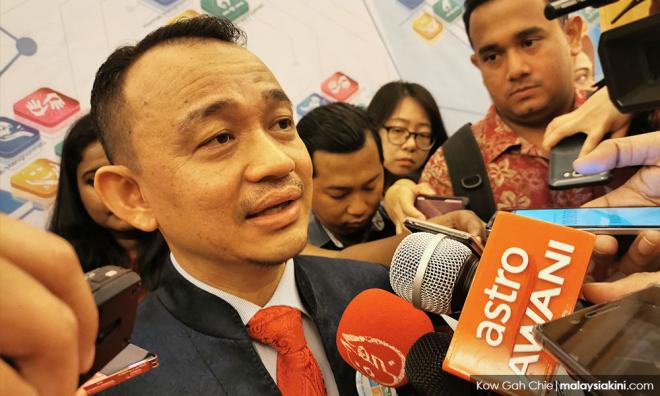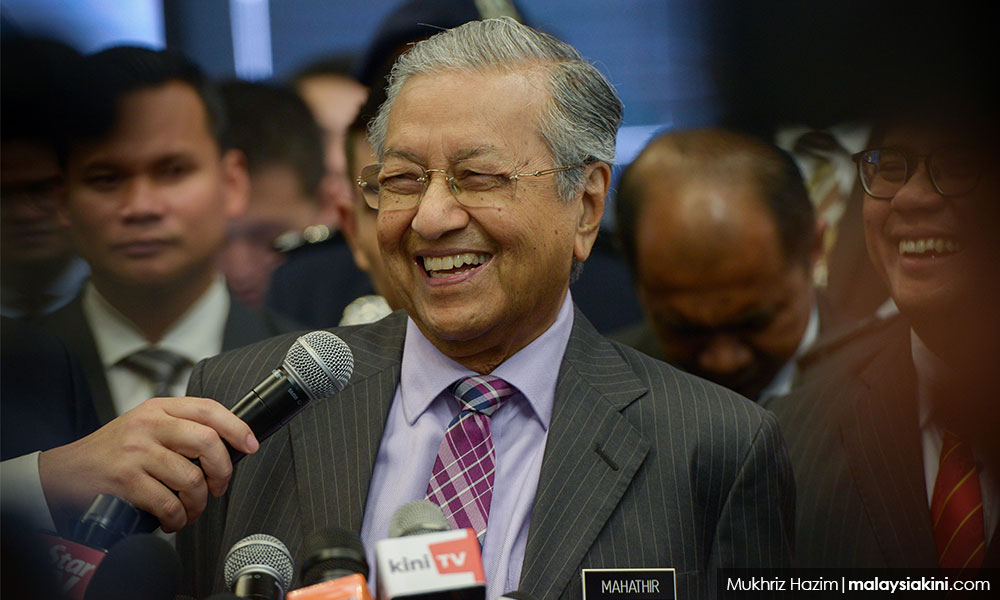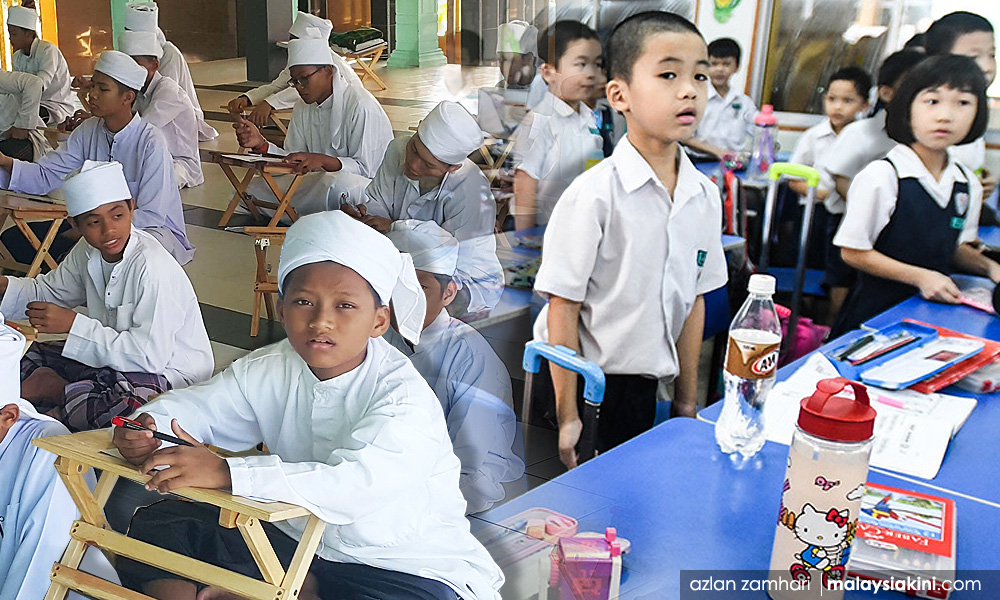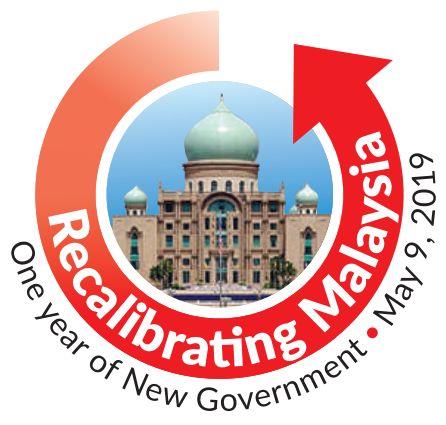FED UP with who wants to be PM and 'problems' in political parties - WE DO NOT CARE. We just want the promised reforms and more that will help all Malaysians...We certainly did not vote for BN 2.0 but for an alternative government of hope and reforms...
What do Malaysians want? We really are not bothered about who will be the next Prime Minister or any of the 'internal fights' happening within the Pakatan Harapan party or any of the other political parties - we want real CHANGES after we elected to out the Barisan Nasional government and give the Opposition Pakatan Harapan (DAP, PKR, Amanah and Bersatu...and the other friendly MPs/parties) a chance...
HEALTHCARE - the cost of healthcare in Malaysia is affordable but not for all - we still have to pay ward charges, surgery charges, etc ...and heart healthcare is just still unaffordable...
'...replace heart valves without open heart surgery..', and do you know how much the ordinary Malaysian will have to pay if you want it. “After that, patients need to know that the CoreValve device will be RM112,000 while another RM10,000 will be needed for other operation costs,”Another achivement by Malaysia's IJN - but how many can afford RM122,000 - Heathcare must be FREE
Medicines - it should be provided until the next doctor's appointmment - now, every month we have to go to the clinic/hospital to collect our monthly supply - this cost a lot for patients - the cost of travel but the cost of time which impacts personal business plus also our employment > there is no right to get 'medical leave'/cuti sakit to take time to go collect our medicines > PH CAN JUST MAKE SURE WE COLLECT ALL OUR MEDICINES UNTIL THE NEXT APPOINTMENT WITH THE DOCTOR - No need to these monthly trips to get our medicine and/or those ofg our elderly parents/dependents or children?
Heart - the cost now can reach to thousands of ringgit for a check up and tens of thousands for a procedure like a by-pass - surely the poor and the middle class cannot afford - Make it free or no more than RM100...
Both spouses need to work - how do our elderly parents and relatives go to hospital/clinic - provide FREE transport for the elderly and/or disabled to go and return from hospitals for their regular check-ups..
If Thailand can charge 30 Baht (about RM3 plus) that will cover everything including ward charges, surgery and other procedures - why can't Malaysia?
See past related post:-More will die sooner because of lack FREE government-provided heart healthcare in Malaysia
Malaysian doctor-population ratio 1:633 but for Sabah(1:1,500) and Sarawak(1:1,104)?
'Fully Paying Patient' program must be ABOLISHED? Discriminatory? Unjust?
IJN not for sale...a national asset BUT is it to provide heathcare for all or just to make money and 'show off'?
EDUCATION - FREE Education until university/college > We still do not have this in Malaysia. If we have this, then one major financial concern for Malaysian parents will end...
[Of course, those who want to sent children to PRIVATE schools, colleges and universities - that is their FREE choice, and they have to pay for it. EDUCATION LOANS could be made available especially for the poor and middle class - not for the super rich...keep interest low].
Many students who are not Malay or natives of Sabah/Sarawak have problems getting places in educational institutions because of QUOTA - well, government should increase places in educational institutions...
QUOTA based on ethnicity need to be REVIEWED - and made Transparent ...What exactly is the ETHNIC QUOTA - Is it 30% or 50% or 60% - it cannot be higher than the ethnic percentage of the population?
What are the other quotas? QUOTA for the poor...quota for those from rural areas... These other socio-economic quotas are also much needed - so how much QUOTA.
BN was very vague on the QUOTA - and PH must be transparent about it?
FREE EDUCATION - another component is also affordable accommodation for students - student colleges and housing need be sufficient. In Klang Valley, the cost of even renting a room is between RM400 and RM800, how can students of most Malaysian afford when minimum wage is RM1,100?
FOOD - well, the BN government effectively removed price control for basic food items > Time for PH to bring back price control for basic food items > RICE, EGG, COOKING OIL, COOKING GAS, CHICKEN, FLOUR, ...'KANGKONG'...Well, just for the basic food items ...
Chicken, egg, bread must be a price controlled items - Why are our MPs not fighting for these basic issues that affect all Malaysians
PUBLIC TRANSPORT - When the then Opposition Pakatan Rakyat(DAP,PKR,PAS) ruled Penang and Selangor they understood this need - so free busses in this States...now they, as PH rule Malaysia, and time to focus on on in-town and in-district effective cheap public transport, which will cut cost of living in having to buy petrol, cars and motorbikes... What is the PH plan for this?
See past related post:-
Transport Minister - Priority provision of efficient affordable public transport for ALL Malaysians?
SHOP HOUSES - Thanks to previous GST and changing patterns in business, there are so many of these 'shop-houses' that are vacant ...including the 1st, 2nd and 3rd floors ...problem now is that it is classified a 'commercial premises', where rates being charged are all the higher 'commercial rates' for electricity, water, telecommunications, Indah Water, ... WHAT PH CAN DO? Allow all these premises, maybe not ground floor, to be used for housing - and if it used for housing, then housing rates shall apply for utilities, etc... This will also reduce cost of living - and help reduce the amount of unused premises. If people stay in town and near business areas, it also will reduce cost of travel, etc..those who work in shops and in town will find that they can now walk to work...With people staying in commercial areas, security increases especially for the smaller towns and rural townships..
Black shoes - Well, there is much to be reformed in our education - many are today choosing to send kids to Chinese schools in small towns - many rich are choosing private schools...Our curriculum need to be reviewed...our HISTORY(according to BN) need to be re-written to reveal the full truth... Languages are a skill and a requirement for higher education and even open doors to more employment opportunities - UMNO-BN policies ended Malaysians skills and command in English ...will PH address this? Mazlee's vision ...Read article below...and the response by Mazlee's press secretary ...and we see that Maslee maybe focusing too little in education at all levels...

Opinion
Maszlee Malik: The most influential or most destructive minister?
COMMENT | Dr Maszlee Malik (above) has squandered a once-in-a-lifetime opportunity to radically reform the Malaysian education system.
He
has the power to influence generations of Malaysians, thus enabling the
nation to realise its true potential, and forge ahead of our
neighbours.
Instead, Maszlee has projected an image of weakness
and given the impression that he is taking orders. Children continue to
be turned into lemmings and the country will tread the same racial path
as before. It is all about "Them" and "Us".
Maszlee has proven
that he is no different from his predecessors in Umno-Baru/BN. Their
education policies, which were designed to stultify Malaysians, did not
encourage children to think or to ask questions.
Fifteen
months ago, Maszlee was thrust from relative obscurity, as a
political-analyst-cum-lecturer at the International Islamic University
Malaysia, to head what is arguably the most important ministry.
Perhaps,
Maszlee is too young to realise that our education system was once one
of the best in Asia.
Its supremacy ended when successive Umno-Baru/BN
governments tinkered with it. Meritocracy was rejected and the
superiority of only one race mattered. Many non-Malay lecturers fled
overseas.
There are enormous challenges involved, but Maszlee's
thrust on the three "Cs" - the colour of shoes, khat calligraphy and
cashless payment in schools, horrified parents.

Of
importance to parents and educationists, are the three "Rs" - reading,
writing and 'rithmetic', as well as better discipline, a reintroduction
of the value-system, instilling respect, and promoting teachers who
encourage critical thinking.
Despite his many reforms, Maszlee's most damaging policy is the maintenance of the quotas in education.
A
parent who displays favouritism amongst his children only encourages
enmity. Similarly, quotas discourage national integration. The people
who are discriminated against will feel bitter and resentful.
Quotas
do not help the Malays. The majority will be under the illusion that
they need not work hard to achieve. Moreover, allegations of pass marks
being lowered only give a false picture of Malay educational attainment.
Prime
Minister, Dr Mahathir Mohamad knows the Malay psyche best. Pampering
the Malays will ensure political dominance, but the downside is that the
Malays, as he has previously acknowledged, become lazy and ineffective.
Some go on to commit corrupt activities.

It
is disingenuous of Maszlee to equate quotas in the matriculation
programme, with the private sector refusing to employ Malays, simply
because they don't speak Mandarin. Many employers reject Malay workers,
because they are used to being pampered, and are not as productive as
the non-Malays. Even Mamak shops prefer foreign workers. Their owners
know only too well about poor performance and frequency of "ponteng" (absenteeism) amongst Malays.
Politicians
have successfully divided Malaysians along racial and religious lines,
resulting in some Malays refusing to shop in non-Malay businesses. If
the non-Malay business clientele is predominantly non-Malay, a
non-Mandarin speaking employee would be detrimental to the business.
Moreover, businesses want to avoid the negative publicity of a Malay
employee who refuses to handle a can of spam or a bottle of beer.
Quotas
in school sports' teams do not foster team spirit and Maszlee must work
with the Youth and Sports Minister, Syed Saddiq Syed Abdul Rahman, to
abolish quotas in sport.
Maszlee claims that many non-Malays are
rich and can afford tuition, or places at private universities.
A
non-Malay would have to be exceptional to win a place in a public
university. The alternative is work, or to enrol in a private
university, where the medium of instruction is in English, which is
considered a hurdle for some Malays. This is because nationalists from
the 70s and 80s said that speaking English was unpatriotic. Maszlee
needs a solution for the Malay reluctance to learn English.
For
many non-Malays, education is the key to escaping the poverty trap. In
my youth, many Malay grandfathers and fathers encouraged their daughters
to have an education. This stopped when the ulamas said that the
woman's place was in the home, for procreation and to care for hubby.
Maszlee should try to re-educate some Malay fathers.
He should not
insult non-wealthy Malays who struggle to educate their children
without government help. He should also mix with more non-Malay
families, to realise that they are not all rich. Many make enormous
sacrifices to provide an education for their children. Tuition is
necessary because our national schools are rubbish.
Is Maszlee
aware that many Malay parents cannot see the value of education for
their children? Some actively encourage their children to stop
schooling, to help them run a food stall. How does Maszlee propose to
change the mindset of these Malay parents?
Despite his background
in the teaching of religious matters, Maszlee should keep religion and
religious teachers out of the classroom. Tahfiz schools should not be
run in isolation, and he needs to bring them into line with the
Malaysian education curriculum.

Today,
more Malay parents enrol their children in Chinese type schools because
of better discipline and learning methods. Could Maszlee learn from
these schools?
If national schools had improved discipline, better
teaching methods and competent teachers, parents would not hesitate to
enrol their children there. With Bahasa Malaysia and English being
compulsory, Chinese or Tamil could be optional extras.
The
indigenous people of Peninsular and East Malaysia are bumiputra and are
heavily discriminated against. What has Maszlee planned for the children
from these communities? Only those who are politically connected
thrive.
Renaming the Permata program to Genius, was a no-brainer.
The highly gifted/intelligent do not need hundreds of millions of
ringgits of help. Benefactors, philanthropists (including the Singapore
government) will beat a path to their doors; however, the money could
help poor and marginalised children, or train more teachers.
It is
imperative for the success of Malaysia that the education system is
upgraded. Maszlee needs to think long-term and abolish quotas. Will he
be able to improve Malaysian education?
MARIAM
MOKHTAR is a defender of the truth, the admiral-general of the
Green Bean Army and president of the Perak Liberation Organisation
(PLO). - Malaysiakini, 23/8/2019
Maszlee has spearheaded genuine education reform
LETTER | I am writing in response
to your columnist Mariam Mokhtar's partial assessment of Maszlee
Malik's tenure thus far as minister of education in her article Maszlee Malik: The most influential or most destructive minister?
While
Mariam has understandably focused on the alleged low points of
Maszlee's tenure - in her usual combative style - there are ongoing
crucial high points leading to genuine education reform that she is
either not aware of or has disregarded.
In the first place, let
us be clear that not all politicians, especially new, first-time Pakatan
Harapan politicians, have been media savvy or cunning enough to
tirelessly face a newly-antagonistic and questioning media - revived,
thanks to the freedoms provided this past year or so by the Harapan
government.
In many ways, it has been a steep learning curve for
all of us facing a demanding and often understandably-impatient
Malaysian public and media.
This
reality check aside, in the area of higher education, some crucial
strategic and policy-related decisions made by Maszlee need to be
highlighted.
In beginning the long journey to reforming a public
university sector battered by decades of political interference and
damage, Maszlee has done at least the following:
1. Setting up a
University Vice-Chancellor Search and Selection committee in September
2018. This committee comprises fiercely independent and respected
scholars and public intellectuals. Since it's establishment, the
committee has evolved through ongoing direct and open discussions with
Maszlee. It has reached a stage where the committee now directly
seeks/searches for the best VC candidates in the country to lead
intellectually and to restructure our public higher education system.
This is pioneering. The wider objective is to reformulate public higher
education - and invariably, higher education in Malaysia as a whole - as
more of a public service and not merely as a commodity dictated by
economic imperatives.
2. Crucial in the development of all
education policies are the integrity and public accountability of
education institutions and those running them. Here, also in late 2018,
Maszlee personally set up an autonomous Academic Integrity Committee to
independently receive and investigate cases of wrongdoing - such as
academic plagiarism and sexual harassment - in our higher education
institutions. This committee reports it's findings directly to the
minister with recommendations.
3. Contrary to some media reports
and perceptions, the total repeal of the Universities and University
Colleges Act (UUCA) and the proposed removal of the academic
restrictions under Act 605 are well underway. Here again, Maszlee has
played a central leadership role in inviting independent, critical
scholars and experts to lead this repeal.
These three examples, I
believe, will suffice for now. There are many more actions that are
being taken over this period, led by Maszlee and his vision for a
vibrant and internationally competitive higher education system grounded
on integrity, independence and intellectual leadership.
My team
and I would be more than happy to discuss these with the media and
concerned writers and critics like Mariam Mokhtar. I may be contacted at
zfzamir@moe.gov.my.
The writer is press secretary to the minister for education. - Malaysiakini, 23/8/2019
Steady hands for nation’s healthcare
- Nation
-
Thursday, 02 May 2019

No instant repairs: Dzulkefly notes that the nation’s healthcare
system is in need of many fundamental reforms, which means there are no
quick fixes.
PUTRAJAYA: After holding the Health
Minister’s post for almost a year, Datuk Seri Dr Dzulkefly Ahmad says he
realised that people want an immediate fix to their problems.While they
want issues such as waiting times for treatment and lack of parking
lots to be resolved quickly, he said he has to grapple with the greater
policies, structures, systems and technological issues that contribute
to the shortcomings and inadequacies in healthcare delivery.
For a
start, he said he was pleased with the increase in budget allocation to
the ministry – from RM26.58bil in 2018 to RM28.68bil this year. It is a
7.12% increase in management expenditure.
“While
I know that we have started embarking on reforms and change, there are
still many things that need to be improved,” he said in a press
conference on Tuesday in conjunction with Pakatan Harapan’s one year
anniversary.
Dzulkefly said a game changer that the government
embarked on was the launch of the operations test phase for the health
protection plan Peduli Kesihatan scheme for B40 (PeKa B40) on April 15,
within the first year of Pakatan coming into power.
As of April 29, as many as 2,443 have been screened for their first visits, he said.
Fully
sponsored by the government, PeKa B40 will focus on health screening
for those aged 50 and above for the B40 group who are receiving Bantuan
Sara Hidup (BSH) as well as their spouses.
The benefits of PeKa
B40 include health screening, the buying of medical devices up to a
maximum of RM20,000, a payment-incentive of RM1,000 when cancer
treatment is completed and up to RM500 for Peninsular Malaysia as well
as RM1,000 for transport allowance in Sabah and Sarawak.
While
the government is looking into social health insurance in the long run,
currently it is tapping into public-private partnerships to achieve a 5%
to 6% gross domestic product
(GDP) expenditure by the end of the next four years.
“The
private sector will drive the increment,” he said, adding that for an
upper middle income country, Malaysia should spend 6% of the GDP.
Currently, Malaysia healthcare expenditure comprises 2.3% of its GDP from the public sector and 2.2% from the private sector.
He
said the current system was not sustainable, and the government and the
people have to look into whether Malaysia should continue with the
current tax-based financing system for healthcare or to set up a social
health insurance.
For this reason, the ministry has set up a seven-member Health Advisory Council on March 27 to come up with ideas.
“The private health sector is seen as profit driven but they are on the same page as me in achieving agenda reform,” he said.
Among
the main challenges he faced besides the re-emergence of some
infectious diseases was addressing the problem of premature deaths as a
result of NCDs (non-communicable diseases), and this is done through a
“promotive and preventive approach”.
“The next reform is to beef up family medicine practice,” he said.
For
almost two decades, Malaysians’ life expectancy reached a plateau of
73.5 years for men and
78.9 years for women ( the average was 75 years).
“It
is not just about life-expectancy but the quality of life that must be
maintained, especially for a country heading towards being an ageing
nation.
“So, I will look into healthcare reforms, as this is key,” he said.
While
looking into bringing changes to the healthcare sector, Dzulkefly also
acted against contractors that failed to deliver health facility
development projects in some states.
Following the termination of
the main contractor for the 300-bed Hospital Petra Jaya in Sarawak in
August last year for failing to meet its completion date on Nov 29,
2016, the Works Ministry re-tendered the project, which closed on April
26.
“The company that will be appointed will be able to revive the project site in October,” he said.
He
said the main contractor for Hospital Rembau (76 beds) was given a
warning after it failed to complete the project on Sept 2016, but the
hospital was now on its way to starting operations in June with a total
allocation of RM104mil.
On another note, the ministry (in
collaboration with Women, Family and Community Development Ministry and
relevant government agencies) had also taken action against Hospital
Sungai Buloh’s orthopaedic head of department for sexual harassment,
said Dzulkefly.
He added that the ministry was also revamping 1Malaysia clinics and transforming them into community clinics.
Of the 347 clinics, 293 will be upgraded to community clinics, 20 will be upgraded to health clinics and 34 will be closed.
On
electronic medical records (EMR), he said it would be implemented in
all 145 government hospitals and 1,700 health clinics in three to five
years.
He said he hoped to lay down the digital health regulatory
framework to enhance online health services as well as to start a pilot
project on virtual clinics to reduce patients’ burden, waiting time and
parking problems.
The Domestic Trade and Consumer Affairs
Ministry is also expected to appoint Price Assistant Officers from among
the Health Ministry’s officers to carry out drug price control
enforcement activities, as it has the power to do so, said Dzulkefly.
The
objective of price control was to ensure that Malaysians have access to
drugs at an affordable price, besides encouraging innovation and
healthy competition for industry growth, he said.
Dzulkefly said
the Cabinet also agreed in September to reduce training for house
officers by implementing the High Performance Housemanship Programme,
which will reduce housemanship from two years to 18 months.
He
said this would help cut down the waiting time for graduates as there
were 31 medical schools in Malaysia, not including those overseas, while
there were only 45 training hospitals to absorb 5,000 to 6,000 new
medical graduates every year.
Meanwhile, he said that the
ministry on Jan 30 issued a guideline on standardising a flexi-work
system in all training hospitals.
The work hours will be reduced from between 65 and 75 hours to between 60 and 62 hours a week.
The
working time for nine disciplines of training is standardised and
divided into flexible morning, afternoon and night sessions.
Dzukefly said the ministry also set up a taskforce to study the possibility of making vaccinations mandatory.
The
proposal would be forwarded to the ministry’s planning committee on May
8 for approval before being brought to the Cabinet for further
scrutiny, he said.
To encourage a healthy work-place ecosystem,
he also asked every ministry staff member to suggest ideas on how to
build up the ministry.
When asked how he would rate his performance in the last one year, Dzulkefly said he would let the people judge for themselves. - Star, 2/5/2019





No comments:
Post a Comment